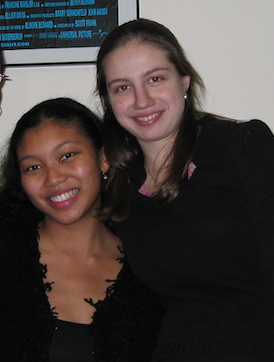Throwback Thursdays: Photos, essays, poems, videos and words of memories from our stuttering past
I often hear the phrase: “listen to what I say, not how I say it” used among people in the stuttering community. For me, this phrase always brings up a specific memory from my senior year in college. I was enrolled in a fantastic story writing class with about eleven other students. For the midterm, we had to submit two pages written in the style of another author of our choosing. I chose Jean Toomer (author of the book Cane, which I had read the year before and loved). I worked very hard and was very proud of the piece I had written. Of course, on the day that midterms were due, my professor decided it would be a good idea to have us read our work aloud. I remember feeling instantly gripped with panic – I was still a covert stutterer at the time and I knew that reading aloud, especially reading my own work, would be a huge struggle.
Sure enough, I stuttered severely through the first half of my piece, at which point my professor asked if I wanted her to finish reading it. I agreed, feeling a mix of relief, sadness, and frustration wash over me.
After class, one of my classmates approached me. The look on her face was somber, dripping with sympathy.
“Gina,” she said. “You stuttered so much and I just felt so sorry for you. I felt so horrible and embarrassed for you.”
Humiliated, I returned to my dorm room. Not long after, I heard a knock on my door. It was another classmate from the story writing class, a friend of mine named Soula. I cringed when I saw her, still reeling from the embarrassment of having let myself stutter in front of everyone and anticipating another “sympathetic” response.
“Can we talk about what you wrote?” Soula asked me. “Because I thought it was amazing.”
When I look back on my stuttering memories – and believe me, I have a plethora of them – this one stands out to me the most. I’ve wanted to be a writer since childhood, but was always afraid that the way I spoke would be a distraction to the words themselves. This experience made me realize that my fears were not totally unfounded, that there are some people who are always going to pay more attention to the way you speak rather than what you have to say. But it also helped me realize that there are people who are capable of seeing you and your stuttering.
What does the expression “listen to what I say, not how I say it” mean to you? Do you have people in your life who do this for you? Are there any situations in which you are afraid that your stuttering will “overshadow” you? If this happens, how might you navigate them?
Gina Davis
Thursday, October 15, 2015
![]()


Gina,
Thank you for your story. It really touched me. I generally work with the idea today to be a graceful stutterer. My focus is both as a person and in how I manage my body & speech. In graduate school I had one class where we had to read a report “out loud.”
Well, reading from set text is a very uncomfortable experience for me. My stutterer was very strong. Having a strong stutter – cool. What was hard was that I lost my sense of ease with stuttering and gracefulness. I was so uncomfortable and embarrassed. I won’t ever forget that.
In hindsight I did not use one technique that always smooths me out and feels graceful. I like to walk around the room in presentations. It brings ease into my body. This experience reminded me of the importance of keeping movement in my body and mind in difficult situations.
best
Elizabeth Kapstein
A lovely phrase, Elizabeth, “be a graceful stutterer.” And Gina, what a breeze of relief to hear Soula knocking on your door…
Hi Elizabeth,
I like the idea of being a “graceful stutterer.” It’s so easy to get caught up in the struggle of a stuttering moment, but it’s something we can work on being mindful of. It sounds like walking/moving during presentations is something that works well for you in terms of remembering to do that.
Thanks for your comment!
Dr. Gina Davis